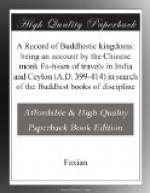(14) {.} {.}, “all the thien,” or simply “the thien” taken as plural. But in Chinese the character called thien {.} denotes heaven, or Heaven, and is interchanged with Ti and Shang Ti, meaning God. With the Buddhists it denotes the devas or Brahmanic gods, or all the inhabitants of the six devalokas. The usage shows the antagonism between Buddhism and Brahmanism, and still more that between it and Confucianism.
(15) Giles and Williams call this “the oratory of Buddha.” But “oratory” gives the idea of a small apartment, whereas the name here leads the mind to think of a large “hall.” I once accompanied the monks of a large monastery from their refectory to the Hall of Buddha, which was a lofty and spacious apartment splendidly fitted up.
(16) The Ts’ung, or “Onion” range, called also the Belurtagh mountains, including the Karakorum, and forming together the connecting links between the more northern T’een-shan and the Kwun-lun mountains on the north of Thibet. It would be difficult to name the six countries which Fa-hien had in mind.
(17) This seems to be the meaning here. My first impression of it was that the author meant to say that the contributions which they received were spent by the monks mainly on the buildings, and only to a small extent for themselves; and I still hesitate between that view and the one in the version.
There occurs here the binomial phrase kung-yang {.} {.}, which is one of the most common throughout the narrative, and is used not only of support in the way of substantial contributions given to monks, monasteries, and Buddhism, but generally of all Buddhistic worship, if I may use that term in the connexion. Let me here quote two or three sentences from Davids’ Manual (pp. 168-170):—“The members of the order are secured from want. There is no place in the Buddhist scheme for churches; the offering of flowers before the sacred tree or image of the Buddha takes the place of worship. Buddhism does not acknowledge the efficacy of prayers; and in the warm countries where Buddhists live, the occasional reading of the law, or preaching of the word, in public, can take place best in the open air, by moonlight, under a simple roof of trees or palms. There are five principal kinds of meditation, which in Buddhism takes the place of prayer.”
CHAPTER IV
Through the Ts’ung or “Onion” Mountains to k’eeh-ch’a;—probably Skardo, or some city more to the east in Ladak




